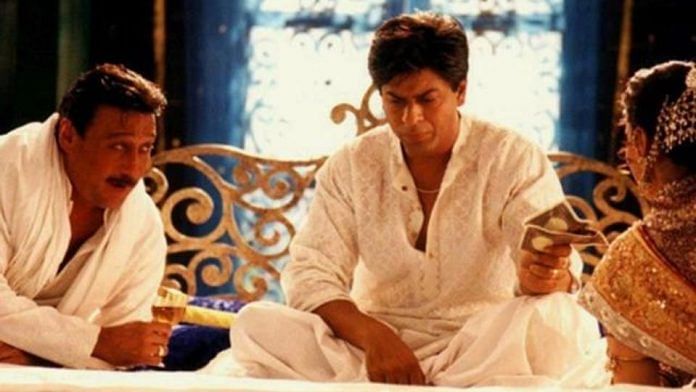It has been 20 years since the alcohol-drenched Devdas was released on 12 July 2002. The plot of this iconic Bollywood movie was based on a book of the same name by the great Bengali author Sarat Chandra Chattopadhyay. Dev and Paro’s tragic love story, played by the beloved Shah Rukh Khan and former Miss World Aishwarya Rai, gained much acclaim from the masses and was even screened at the Cannes Film Festival. But the film renewed for the new generation the old toxic Indian problem of looking at alcoholism through the lens of romantic loss, and not for the problem that it is.
The story of Devdas crystallises this cultural pathology. In our everyday lives, we often equate someone going through a heartbreak or their unhealthy alcohol consumption as being a Devdas.
Indians don’t treat alcoholism as a mental health, substance-abuse issue. Throughout our literature, films, music and performing arts, alcoholics get a free pass. And this isn’t limited to just songs or a few movies. Indori Ishq, a web series written by Kunal Marathe, also deals with a modern Devdas (played by Ritvik Sahore), where rejection by a love interest means drowning oneself in alcohol and destroying their career and other relationships.
Also read: Devdas: The tragic hero act that made KL Saigal a household name
The glorification syndrome
From Devdas and Sharaabi (1984) to Amar Akbar Anthony (1977) and Namak Haram (1973), Bollywood has glorified alcoholism as something that serves as a testament to unrequited love, social disenchantment, poetic angst and machismo. It is romanticised as a coping mechanism or offered as comic relief. From Amitabh Bachchan swaying like a leaf in Namak Halaal’s (1982) song Thodi si jo pee lee hai to Chote Chote peg from Sonu Ke Titu Ki Sweety (2018), somehow the mainstream Indian entertainment industry has made alcohol an indispensable part of both joyous celebration and painful yearning.
From being served as a medium for teary-eyed Aamir Khan or Shah Rukh Khan trying to prove their affection for their female love interest in movies such as Raja Hindustani or Devdas, alcohol is now more a party element. The fame of Honey Singh and more pop-Punjabi music like Char Bottle Vodka and Daru Desi has led to party playlists becoming an amalgamation of lyrics about shots and pegs. These songs have also taken a feminist angle, whether it be Zara Sa Jhoom Loon Main from Dilwale Dulhania Le Jayenge or Lat Lag Gayee from Race 2, Bollywood has fostered a safe space for even women to drink, but only at parties.
Women who drank in Hindi movies were of course morally corrupt or evil vamps. They didn’t have the luxury of broken hearts and public sympathy. Drunken women are rarely romanced by the male heroes. They don’t even hold their hair up. Of course, the number of Indian men reciting and slurring Harivansh Rai Bachchan’s Madhushala lines at drunken parties was the stuff of north Indian men through the 1980s and 1990s. From Ghalib to Bachchan, the trip to maikhana and madhushala (or your local theka) can be a spiritual, political and revolutionary act.
As for men, the alcohol-addict plots end up either with fatal liver disease shown by constant puking and worrisome family members surrounding the protagonist. If not, a mysterious epiphany makes them realise the danger and quitting the addiction when they find their lover back as in Kabir Singh or Dev starting a new life with Chanda in Dev D. Usually, though, there is not much of a rehabilitation process, or what it is in real life. Often, clouds of smoke that were previously shown to be justified now suggest mental anguish as they waft over the protagonist’s face.
Also read: Why Bimal Roy’s Devdas remains the first among equals
Another upgrade is due
In recent times, we saw Kabir Singh and Aashiqui 2 depict what can be termed as modern-day Devdas, with their troubling validation — by way of alcoholism — of the idea of women abuse. “He was just heartbroken”, “she broke his heart she deserved it” — such statements are used to justify acts of violence. Even though they do try to show it as wrong in the end, somewhere along the way, the aestheticisation of alcohol — and alcoholism — has won over the audience.
Today, it is time to shift the alcohol narrative in Indian cinema too. A small textual disclaimer at the bottom of the screen during scenes of alcohol consumption is as effective as not having one. The more essential thing to be done is to seclude bottles of vodka from the idea of being a man who feels pain but is too bound by patriarchal society to cry and healthily deal with his issues.
This gloomy lover-boy trope has gone too far and too long, influenced too many real people and ruined too many relationships. Both the audiences as well as filmmakers need to realise that 20 years later, watching Shah Rukh Khan die in the name of love when the actual reason for his death is alcoholism won’t cut it anymore.
Our popular culture plots need an upgrade. If your friend is going on a bender, don’t justify it in the name of a broken heart, give them the number of a therapist and a friendly neighbourhood de-addiction centre.
Views are personal.
(Edited by Prashant)



